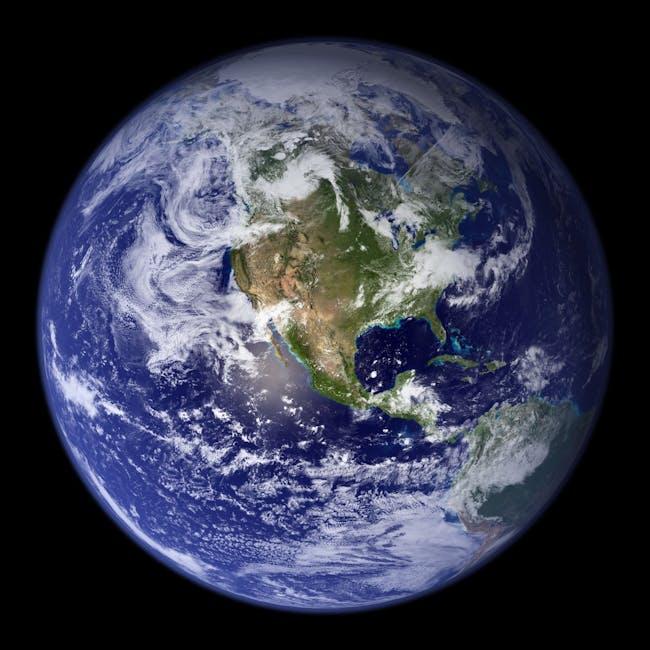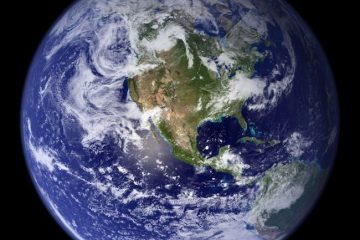Table of Contents
- Exploring the Roots of the Gaia Hypothesis and Its Scientific Foundations
- Key Arguments for and Against the Gaia Hypothesis in Contemporary Science
- The Role of Climate Change in the Gaia Hypothesis Debate
- Implications of the Gaia Hypothesis for Environmental Policy and Ethics
- Public Perception and the Influence of Media on the Gaia Controversy
- Q&A
- In Conclusion

Exploring the Roots of the Gaia Hypothesis and Its Scientific Foundations
The Gaia Hypothesis, proposed by scientist James Lovelock in the 1970s, suggests that the Earth and its biological systems behave as a single, self-regulating entity. This idea combines principles from ecology, evolutionary biology, and global climate regulation, positing that living organisms interact with their inorganic surroundings to maintain conditions conducive to life. At the heart of this hypothesis lies the notion that the planet’s biological and physical components are interconnected, working in harmony to sustain complex ecosystems. Lovelock’s work was significantly influenced by the challenges of understanding planetary climate systems, particularly in light of emerging concerns about ecological degradation and climate change.
Critics have raised questions regarding the scientific underpinnings of the Gaia Hypothesis, often challenging its validity within established scientific paradigms. Some argue that the hypothesis lacks empirical support and predictability, leading to its classification as a metaphor rather than a rigorous scientific theory. While proponents underscore the importance of viewing Earth as an interconnected system, others maintain that biological processes can be understood through reductionist approaches that focus on individual species and their interactions. This ongoing debate highlights the tension between holistic and reductionist perspectives within the scientific community.
Despite its controversies, the Gaia Hypothesis has inspired a multitude of research initiatives and interdisciplinary studies aimed at understanding planetary health and ecosystem resilience. Here are a few notable contributions stemming from this hypothesis:
- Earth System Science: A field dedicated to understanding interactions across various Earth systems.
- Climate Change Research: Investigating how biological and geological processes influence climate patterns.
- Sustainability Practices: Promoting eco-friendly approaches that recognize the interconnectedness of life and the environment.
To visually summarize some key aspects of the Gaia Hypothesis and its scientific foundations, the following table highlights the contrasting views within the debate:
| Aspect | Proponents’ View | Critics’ View |
|---|---|---|
| Interconnectedness | Essence of life on Earth | Potential oversimplification |
| Scientific Validity | Framework for understanding systems | Lacks empirical rigor |
| Impact on Policy | Advocates for ecological preservation | Encourages reductionist approaches |
Key Arguments for and Against the Gaia Hypothesis in Contemporary Science
The Gaia hypothesis posits that Earth and its biological systems behave as a single, self-regulating entity. Proponents argue that viewing the planet through this lens can deepen our understanding of ecological interdependencies. Key arguments supporting this view include:
- Holistic Perspective: The hypothesis encourages a comprehensive understanding of Earth’s systems, emphasizing the importance of biodiversity.
- Evidence of Regulation: Observations of natural systems show feedback mechanisms that maintain conditions suitable for life, supporting the idea of a self-regulating entity.
- Promotes Environmental Awareness: Advocates claim that recognizing Earth’s interconnectedness can inspire conservation efforts and global ecological responsibility.
Conversely, critics raise significant concerns regarding the validity of the Gaia hypothesis. The main arguments against it include:
- Lack of Empirical Evidence: Detractors argue that the hypothesis lacks rigorous, testable predictions and substantiation through scientific experiments.
- Anthropomorphism: Critics contend that attributing agency to the Earth’s systems can mislead our understanding, as it risks interpreting natural phenomena as purposeful actions.
- Over-simplification: The complexity of ecological interactions means that viewing Earth as a singular entity may gloss over localized and nuanced ecological dynamics.
Scholars continue to engage in debate, weighing the strengths and weaknesses of the Gaia hypothesis against its implications for environmental science. The current discourse highlights the ongoing need for interdisciplinary approaches in ecology, climate science, and environmental policy. Here’s a brief overview of the contrasting perspectives:
| Arguments For | Arguments Against |
|---|---|
| Holistic understanding of ecological systems | Lacks empirical support and scientific rigor |
| Highlights self-regulation in biological systems | Risks anthropomorphism and misinterpretation |
| Encourages proactive environmental stewardship | Potential oversimplification of complex interactions |

The Role of Climate Change in the Gaia Hypothesis Debate
The interconnection between climate change and the Gaia Hypothesis has sparked intense discussions among scientists, environmentalists, and philosophers. At its core, the Gaia Hypothesis posits that the Earth functions as a self-regulating system, where biological and geological factors work in tandem to maintain conditions suitable for life. As climate change accelerates, this delicate balance faces unprecedented challenges, raising questions about the resilience and adaptability of Earth’s systems. The debate centers on whether humanity is tipping the scales towards a planetary crisis or, conversely, if it can harness the Gaia principle to foster recovery and regeneration.
Critics of the Gaia Hypothesis often argue that climate change illustrates the fragility of this system rather than its self-sustaining capabilities. They point out that rising temperatures, increasing carbon emissions, and biodiversity loss indicate a departure from equilibrium, suggesting that human influence has disrupted this symbiotic relationship. This perspective highlights the role of anthropogenic activities in exacerbating climate impacts, which some see as a fundamental flaw in the notion that Earth can auto-correct its course. Key factors in this argument include:
- Anthropogenic Carbon Emissions: Accelerating climate change driven by fossil fuel consumption.
- Biodiversity Loss: Habitat destruction leading to extinction rates higher than natural backgrounds.
- Extreme Weather Events: Increasing frequency of hurricanes, floods, and droughts disrupting local ecosystems.
Conversely, proponents of the Gaia Hypothesis suggest that the planet might still possess the resilience to adapt to changing climate conditions. They argue for a more profound understanding of ecological interactions, material cycles, and feedback mechanisms that can potentially mitigate adverse effects. This perspective emphasizes the importance of restoring ecosystems and fostering sustainable practices. They highlight how vital actions can draw on the Gaia principle, such as:
| Action | Potential Benefits |
|---|---|
| Reforestation | Carbon capture, enhanced biodiversity. |
| Sustainable Agriculture | Soil health, decreased emissions. |
| Wetland Restoration | Flood mitigation, habitat support. |
Ultimately, the intricate relationship between climate change and the Gaia Hypothesis continues to unfold, illustrating not only the vulnerabilities of Earth’s systems but also the potential paths towards recovery. The ongoing debate serves as a crucial platform for exploring effective interventions and understanding our shared responsibility in shaping the future of our planet. As scientists, policymakers, and communities engage in this dialogue, the outcomes will undoubtedly influence environmental strategies and our philosophical perspectives on the Earth and its inhabitants.

Implications of the Gaia Hypothesis for Environmental Policy and Ethics
The Gaia Hypothesis presents a compelling framework that looks at Earth as a dynamic, self-regulating system that fosters life. This perspective urges us to rethink our environmental policies, advocating for a comprehensive approach that aligns human activity with the planet’s natural processes. By recognizing that the Earth operates as a collective unit, policymakers are prompted to consider the interconnectedness of ecosystems when developing regulations. This holistic view encourages strategies that not only aim for sustainable development but also protect the intricate web of relationships within our biosphere.
Ethical considerations stemming from the Gaia Hypothesis challenge traditional anthropocentrism, which places human interests above those of other life forms. In this light, environmental ethics must evolve to incorporate a biocentric or even ecocentric perspective, emphasizing the intrinsic value of all living organisms. This shift could lead to:
- Enhanced conservation efforts to protect biodiversity.
- Policies promoting sustainable agricultural practices.
- Regulations that prioritize carbon footprint reduction across industries.
As policymakers grapple with the implications of the Gaia Hypothesis, it becomes essential to adopt adaptive management approaches that reflect the complexities of ecological systems. This involves an iterative process where policies are continuously tested and refined based on their effectiveness and the resilience of ecosystems. The table below offers a brief overview of adaptive management strategies that can be integrated into environmental policy:
| Strategy | Description |
|---|---|
| Adaptive Ecosystem Monitoring | Regularly assessing ecological health to inform policy adjustments. |
| Stakeholder Engagement | Involving community input in decision-making processes to foster collaboration. |
| Scenario Planning | Exploring multiple future outcomes to prepare for uncertainties. |

Public Perception and the Influence of Media on the Gaia Controversy
The Gaia hypothesis has sparked significant debate over the years, often influenced by prevailing media narratives that shape public perception. Media portrayal can amplify skepticism and acceptance in equal measures, creating a rich tapestry of discourse surrounding this ecological theory. Notably, the representation of scientific findings and environmental concerns often shifts with the sensationalism or factual rigor employed by reporters, thus filtering how audiences consume information regarding the hypothesis. When depicted through a lens of urgency, the concept of Earth as a self-regulating system may drive public action, while a more skeptical tone could encourage questioning of its validity.
The role of social media further complicates the dialogue, fostering a platform where misinformation can spread rapidly. This instant accessibility allows diverse opinions to flourish, often leading to polarized views among the public. In this environment, the following factors contribute notably to the perceived credibility of the Gaia hypothesis:
- Expert Endorsements: Scientists and credible organizations that support or refute the hypothesis.
- Documentaries and Features: Visual storytelling that can either clarify or obscure the scientific basis.
- Public Figures: Influencers and activists who champion or criticize the concept.
In juxtaposing these influences, it becomes evident that media not only informs but actively shapes the landscape of public opinion. A comparison of engagement and belief systems illustrates the varying degrees of acceptance across different demographics:
| Demographic | Support for Gaia Hypothesis | Opposition to Gaia Hypothesis |
|---|---|---|
| Millennials | 65% | 25% |
| Gen X | 50% | 40% |
| Baby Boomers | 40% | 55% |
This data highlights a generational divide, likely reflecting distinct media consumption habits, educational backgrounds, and environmental awareness levels. As the conversation around the Gaia hypothesis continues to evolve, understanding the interplay between media influences and public perception will be crucial in navigating future debates within the scientific community and the general populace.
Q&A
Q&A on the Gaia Hypothesis Controversy
Q1: What is the Gaia Hypothesis? A1: The Gaia Hypothesis, proposed by scientist James Lovelock in the 1970s, suggests that Earth’s biological and physical processes are interconnected to form a self-regulating system that maintains conditions for life. Essentially, it posits that the planet functions as a single, self-sustaining organism, with living organisms interacting with their inorganic surroundings to promote life.Q2: Why has the Gaia Hypothesis sparked controversy? A2: The controversy surrounding the Gaia Hypothesis largely stems from its implications for how we perceive life and the environment. Critics argue that the idea anthropomorphizes Earth, suggesting a level of intentionality in its processes. This notion challenges traditional scientific approaches that emphasize competition and randomness rather than collaboration and balance in ecosystems.
Q3: What are the main arguments against the Gaia Hypothesis? A3: Critics often cite several key points: the absence of empirical evidence supporting the idea that Earth’s systems actively self-regulate, the misunderstanding of natural selection’s role in evolving life forms, and the difficulty in measuring or modeling the complex interactions between Earth’s components. They argue that while ecosystems display some regulatory characteristics, these do not equate to the planet as a conscious being.
Q4: Who supports the Gaia Hypothesis, and why? A4: Proponents, including Lovelock himself and other environmentalists, argue that the Gaia Hypothesis offers a holistic view of Earth’s systems that enhances our understanding of ecological interdependence. Supporters emphasize its relevance in promoting environmental stewardship and addressing climate change, as it encourages viewing humanity as part of a larger ecological framework.
Q5: How has the scientific community responded to the Gaia Hypothesis? A5: The scientific community remains divided. While some researchers embrace the ideas related to the interconnectedness of life and the environment, others maintain a more skeptical view, insisting on data-driven approaches to understanding ecological dynamics. Diverse fields like ecology, climatology, and evolutionary biology are grappling with the implications of the hypothesis, contributing to ongoing discussions.
Q6: Has the Gaia Hypothesis influenced environmental movements? A6: Yes, the Gaia Hypothesis has significantly influenced environmental movements and discussions on sustainability. It has provided a philosophical framework for understanding the importance of preserving biodiversity and maintaining ecological balance, serving as an inspiration for many activists and policy-makers advocating for environmental reforms.
Q7: What impact does the controversy around the Gaia Hypothesis have on scientific discourse? A7: The controversy surrounding the Gaia Hypothesis has spurred robust scientific debate, encouraging researchers to explore the complex relationships between living organisms and their environment. This ongoing dialogue fosters innovation in ecological research and promotes critical thinking about how best to approach environmental challenges.
Q8: Where can someone learn more about the Gaia Hypothesis and its implications? A8: Interested readers can explore various resources, including Lovelock’s original writings, academic journals, documentaries, and books focused on ecological science and climate change. Organizations dedicated to environmental science often provide educational materials that delve deeper into the Gaia Hypothesis and its relevance to contemporary ecological issues.



0 Comments